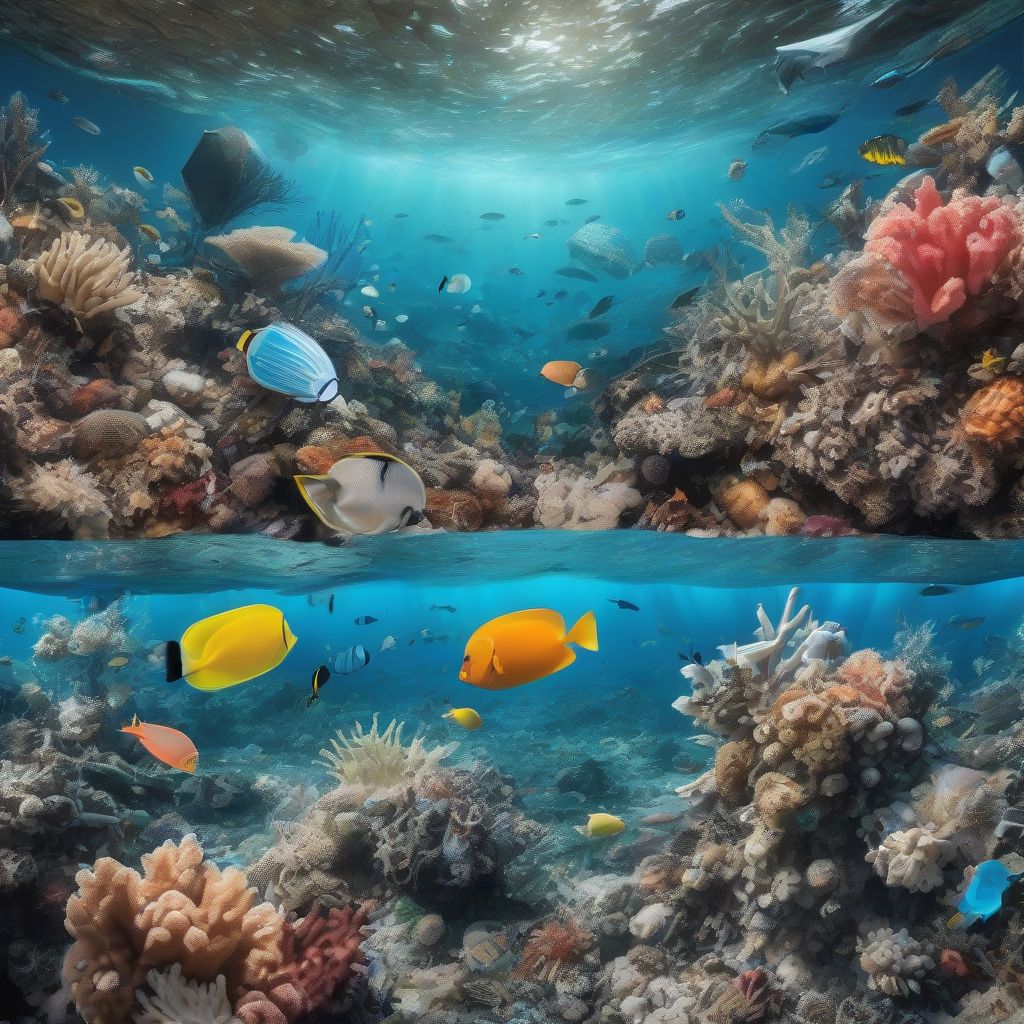Imagine a vibrant coral reef teeming with life, a kaleidoscope of fish darting through the water. Now picture that same reef, choked with plastic, the coral bleached white, and the fish nowhere to be seen. This, unfortunately, isn’t just a hypothetical scenario; it’s the reality of how ocean pollution is devastating marine biodiversity across the globe.
The Devastating Impact of Pollution on Marine Life
Our oceans, the lifeblood of our planet, are facing an unprecedented crisis. Pollution, in its many forms, is wreaking havoc on marine ecosystems, disrupting the delicate balance of life and threatening the survival of countless species. From the tiniest plankton to the largest whales, no creature is immune to the devastating effects of our waste.
Plastic: A Persistent Threat
Plastic pollution is arguably the most visible and pervasive form of ocean pollution. Every year, millions of tons of plastic enter our oceans, from discarded bottles and bags to microplastics that are virtually invisible to the naked eye. Marine animals often mistake plastic debris for food, leading to ingestion, starvation, and entanglement. Sea turtles, for instance, often confuse plastic bags for jellyfish, a staple of their diet. “Seeing a sea turtle struggling with a plastic straw lodged in its nose is a stark reminder of the consequences of our actions,” says Dr. Emily Carter, a marine biologist specializing in plastic pollution research.
Chemical Contamination: A Silent Killer
While less visible than plastic, chemical pollution poses an equally serious threat. Industrial discharge, agricultural runoff, and sewage contaminate our waters with a cocktail of toxins, including heavy metals, pesticides, and pharmaceuticals. These chemicals can accumulate in the tissues of marine organisms, causing developmental problems, reproductive issues, and even death. They can also disrupt entire food webs, leading to cascading effects throughout the ecosystem.
Noise Pollution: Disrupting Communication
The ocean is a symphony of sounds, vital for communication and navigation among marine animals. However, human activities, such as shipping, oil exploration, and sonar use, are creating a cacophony of noise that interferes with these natural soundscapes. Noise pollution can disorient marine mammals, making it difficult for them to find food, mates, and safe havens. It can also lead to stress, hearing loss, and even strandings.
Climate Change: Exacerbating the Problem
Climate change, driven by human activities, is further exacerbating the impacts of ocean pollution. Rising ocean temperatures are leading to coral bleaching, a phenomenon that weakens and can kill entire coral reefs, which are vital habitats for countless marine species. Ocean acidification, caused by the absorption of excess carbon dioxide from the atmosphere, makes it harder for shellfish and other organisms to build their shells and skeletons.
The Ripple Effect: Consequences for the Ecosystem and Us
The consequences of ocean pollution extend far beyond the immediate harm to marine life. The loss of biodiversity can destabilize entire ecosystems, disrupting food webs and impacting the ocean’s ability to regulate the climate. This, in turn, has profound implications for human societies that rely on the ocean for food, livelihoods, and recreation. “Protecting our oceans is not just about saving whales and dolphins; it’s about safeguarding our own future,” emphasizes Dr. Jane Goodall, renowned primatologist and environmental activist.
 Ocean Pollution Impact Marine Biodiversity
Ocean Pollution Impact Marine Biodiversity
Taking Action: Protecting Our Oceans
The good news is that we can still make a difference. Addressing ocean pollution requires a multi-pronged approach involving individuals, governments, and industries. We can all contribute by reducing our plastic consumption, supporting sustainable seafood choices, and advocating for stronger environmental regulations.
Individual Actions: Making a Difference Every Day
We can all play a part in reducing ocean pollution by making conscious choices in our daily lives. Simple actions like using reusable bags, water bottles, and coffee cups can significantly reduce our plastic footprint. Properly disposing of waste and participating in beach cleanups can also make a tangible difference.
Government Policies: Setting the Stage for Change
Governments have a crucial role to play in implementing policies that address ocean pollution at its source. This includes enacting stricter regulations on industrial discharge, promoting sustainable fishing practices, and investing in research and development of innovative solutions.
Industry Innovations: Paving the Way for a Cleaner Future
Industries can contribute by adopting more sustainable practices and investing in technologies that reduce pollution. This includes developing biodegradable plastics, improving wastewater treatment processes, and exploring alternative energy sources.
Conclusion: A Call to Action
The health of our oceans is inextricably linked to our own well-being. By understanding the devastating impact of ocean pollution on marine biodiversity, we can be empowered to take action and protect this precious resource for generations to come. Let’s work together to create a future where our oceans teem with life once again. What actions will you take today to protect our oceans? Share your thoughts and ideas in the comments below, and let’s inspire each other to make a difference. Explore our website for more information on ocean conservation and how you can get involved.



